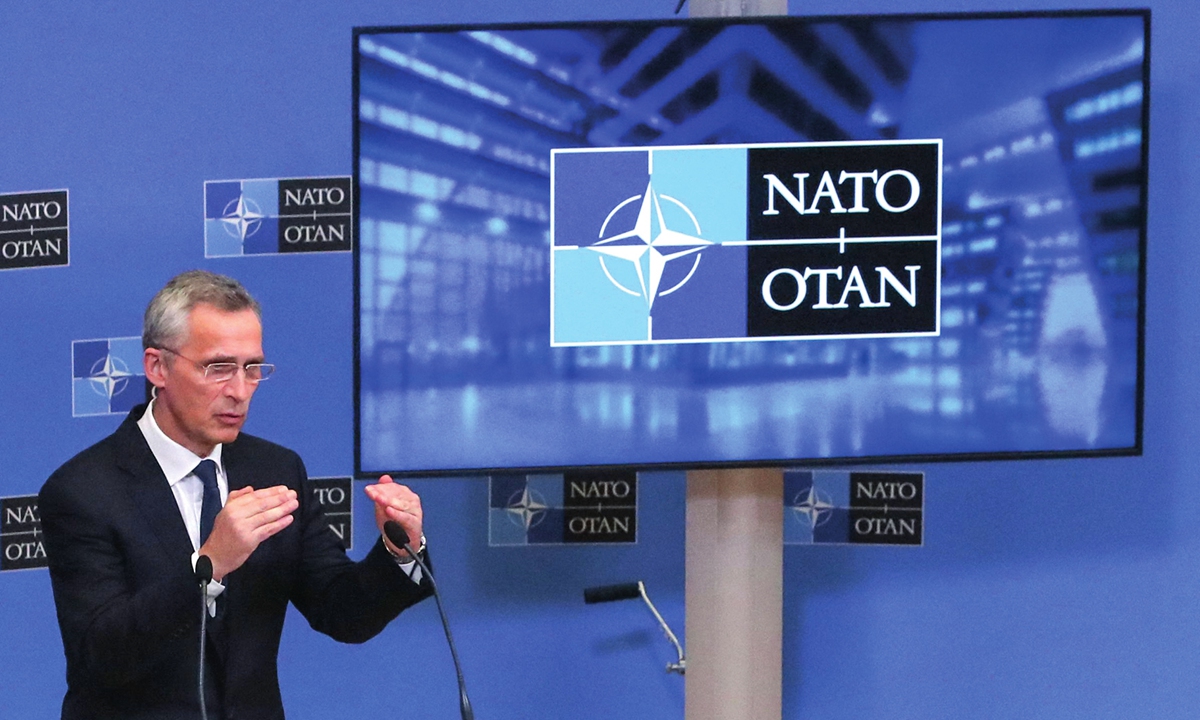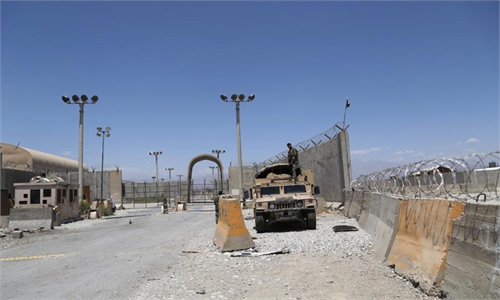NATO chief shows hypocrisy, double-standard in urging China to join nuclear control talks

NATO Secretary General Jens Stoltenberg holds a press conference following a NATO foreign ministers in-person meeting at NATO's headquarters in Brussels in June. Photo: VCG
Chinese observers said on Tuesday that NATO chief's picking on China over the topic of nuclear arms was nothing else than to implement a US agenda to compete with and contain the rise of China, in order to hold a permanent strategic edge over China.
Jens Stoltenberg, Secretary-General of the US-led military alliance NATO, said at its annual arms control conference on Monday that China should join international efforts to limit the spread of nuclear weapons while claiming that "Beijing, too, would benefit from mutual limits on numbers, increased transparency, and more predictability," AP reported.
Stoltenberg's remarks came shortly after US Secretary of State Antony Blinken added the so-called rapid growth of China's nuclear arsenal to the long-running US objections to "Chinese behavior" during his meeting with leaders from South Asian countries, Wall Street Journal reported in August citing a State Department press release.
Blinken added that the buildup of nuclear arsenal "highlights how Beijing has sharply deviated from its decades-old nuclear strategy based on minimum deterrence."
It is not surprising that Stoltenberg, a former prime minister of Norway, would parrot US old tunes in attempts to implement the will of Washington, to propagate a groundless China nuclear-threat theory, Song Zhongping, a military expert and TV commentator, told the Global Times on Tuesday.
Song also noted that forced by the US, the NATO is investing heavily eastward, as far as at the doorstep of China.
Li Haidong, a professor at the Institute of International Relations at the China Foreign Affairs University, smelt a sense of hypocrisy in the NATO chief's statement. "Stoltenberg claimed that Beijing would benefit from joining international efforts to limit the spread of nuclear weapons in terms of enhanced transparency and mutual trust on the surface, but underneath there is an actual agenda to work with the US toward the goal of holding a forever edge over China in the strategic domain."
Li pointed out that strategic deterrence that comes with China's nuclear power is the fundamental reason why the US-led Western world is taking a rather cautious step when handling relations with China. And what worries the US and NATO, if not dragging China into the current system to limit its nuclear development, is the loss of US' advantage of power in the coming years.
However, the alliance doesn't agree on the issue concerning China, as some European countries do not feel direct security threat from China. What Stoltenberg is trying to achieve now is to create a crisis atmosphere within the alliance, Li noted.
Earlier in June, the NATO chief told media that "The global balance of power is shifting with the rise of China," and "So we, NATO, realize that the rise of China matters for our security." He warned of "security consequence of the rise of China."
China has always adhered to a nuclear strategy of self-defense and has always maintained its nuclear force at the lowest level required for national security, Chinese Foreign Ministry spokesperson Wang Wenbin said on Tuesday.
"We are committed to no first use of nuclear weapons at any time or under any circumstances and pledge unconditionally not to use or threat to use nuclear weapons against non-nuclear weapon states or nuclear-weapon-free zones," Wang said.
Commenting on Stoltenberg's remarks, Wang told the routine press conference on Tuesday that if NATO really cares about nuclear arms control, it should abandon the cold war mentality, abolish nuclear sharing arrangements, withdraw the large number of nuclear weapons deployed in Europe, and urge the US to take responsibility of nuclear disarmament, and to further substantially reduce its arsenal in order to create conditions for complete nuclear disarmament.
Many countries believe that NATO's nuclear sharing arrangements violate the provisions of the Nuclear Non-Proliferation Treaty and that its nuclear capability lacks transparency, which intensifies the risk of nuclear proliferation and nuclear conflict. NATO avoids talking about this, and instead continues to confuse people and hype up the so-called China nuclear threat theory. This is a typical act of double-standard, Wang said.
According to the statistics from renowned international think tanks such as the Federation of American Scientists and SIPRI, the US nuclear arsenal stands at about 5800 nuclear warheads, which is almost 20 times that of China, Fu Cong, director-general of the arms control department of the Chinese Foreign Ministry, shared at a press briefing on international arms control and disarmament in July 2020.
Military experts said given the current situation where China is faced with malicious challenges initiated by the US in the field of national security and even sovereignty, China's buildup of nuclear arsenal is about safeguarding its own legitimate interests and rights.
"China has only too few of nuclear warheads to join the so-called limitation talks, and it needs to increase the number to a level at least more than one tenth of US' total so that it can effectively protect itself," Song said.


